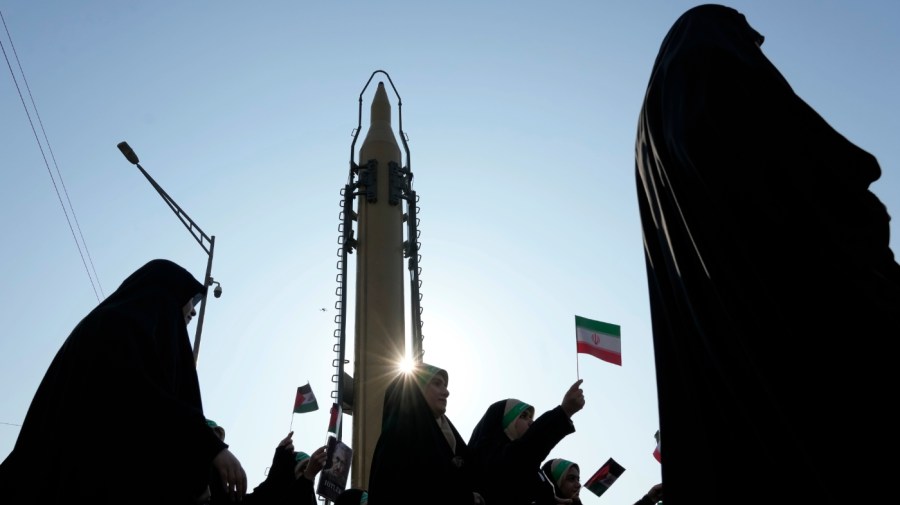
During World War II, the butler of the British ambassador to Turkey was spying on the Allies. As a butler, he had access to the ambassador’s files and was able to uncover and copy top-secret information, including the Allies’ plans for D-Day. Fortunately, the Germans considered him unreliable and disregarded the information.
We may not realize it at the moment, but sometimes a singular incident can have far-reaching effects, setting off a sequence of events no one could have foreseen.
The atrocities carried out at the hands of Iran’s proxy Hamas on Oct. 7, 2023, have proved just such a moment, with ramifications extending well beyond the slaughter and torture of women and children in Israel.
As Israel continues to dismantle Hamas, it has also significantly diminished the effectiveness of another of Iran’s proxies, Hezbollah, closing Lebanon’s border with Syria.
With Hezbollah destabilized, an opportunity presented itself in Syria. A former al Qaeda affiliate, Hayat Tahrir al-Sham, seized the moment (along with other rebel groups) for a long-awaited assault on Assad — securing the fall of the Assad regime within 10 days.
The rebels are now in full control of Syria, and with Assad’s “humanitarian” asylum in Russia, Iran’s complex of regional proxies is substantially reduced.
Like dominoes striking each other — Hamas, Hezbollah and finally Syria — regional ambitions of Iranian influence have been severely undermined.
Iran is at a crossroads. It can either embrace “realpolitik” through practical, realistic negotiations with the West, or it can “roll the dice” in its quest to become a nuclear power.
United Nations Chief Nuclear Inspector Rafael Grossi recently reiterated his concern: Iran was increasing its stores of purified uranium and was perilously close to a concentration required for nuclear weapons.
Around the same time, Iran’s former nuclear negotiator, Mohammad Javad Zarif, called for discussions to resume regarding the country’s nuclear program. Ostensibly, Iran’s new “open-minded” president, Masoud Pezeshkian, seeks to “engage constructively with the West.”
Iran’s vistas, via its no longer substantial “axis of resistance,” are at best severely compromised. Will it choose the more plausible path of “realpolitik” or tempt fate in the face of an emboldened Netanyahu and Trump?
Iran has pursued a less extreme foreign policy with the West before, during the presidency of Ali Rafsanjani — exhibiting a more cordial demeanor. A similar policy could conceivably bear fruit again with Pezeshkian.
The question before us is twofold — will Iran choose wisely? And will Trump give “realpolitik” a chance to “bear fruit,” if Iran so chooses?
Sen. Marco Rubio (R-Fla.), Trump’s designee for secretary of State, has been quite vocal about his estimate of the dangers of Iran. Sensing Iran’s weakness, it is possible (via influence from his advisors) that President-elect Trump will accept nothing less than a complete withdrawal from its nuclear program.
It is hoped that cooler and more rational heads prevail in the administration, since much of what drives Iran’s leadership (religious and otherwise) is respect from the West and acceptance by the Arab League. Thus, Iran’s leaders are not keen to abandon that upon which the country has staked so much of its effort for respect and power — its nuclear program.
Yet there remains the possibility (and hope) that Iran will employ a more plausible approach in its discourse with the West — conceivably retaining its nuclear program for domestic use only. This will allow Iran to save face.
Today, Middle East experts agree that China, not Iran, poses the top threat to Washington. Iranians mobilized in numbers for democracy in reaction to the 2009 presidential election. And although history is not a sufficient predicate for defending national interests, let us not forget that, according to declassified CIA documents, it was the U.S. and Britain who denied Iran democracy once before — through a CIA/MI6-engineered coup.
In the absence of Assad, there is little reason for Iran to pursue an alternative (and potentially counterproductive) political “nuclear” agenda.
Given Israel’s superior nuclear and conventional military capability, and the anticipated arrival of President-elect Trump, “realpolitik” is Iran’s best option — one of realistic expectations and transparency regarding its nuclear designs.
If Israel senses that Iran is opting for a nuclear agenda, it will not hesitate (with or without U.S. acquiescence) to eliminate Iran’s nuclear facilities. (This plan has already been rehearsed for immediate implementation.)
What’s more, Iran is well aware of Israel’s concerns and capabilities, should it forego a “realpolitik” (more pragmatic) solution to its political dilemma.
With the right diplomatic overtures from the Trump administration, Iran can be brought into the orbit of constructive bilateral relations with the West.
Several conditions are key to allow Iran and the U.S. to achieve a sustainable nuclear agreement while allowing each to claim credit for success.
The Trump administration should reopen talks with Iran via direct negotiations with Pezeshkian — implementing the “Non-Proliferation Treaty” — to include verification of Iran’s nuclear program. Iran (as compensation) must receive sanctions relief. As a consequence of this achievement, the Persian Gulf countries should establish a nuclear-free zone in the region as a first step toward collective security.
The U.S. should conclude the effort through further negotiations to foster a comprehensive agreement between the countries of the region to establish (via treaty) an integrated mechanism towards mutual security and collaborative cooperation.
Trump’s administration faces an opportunity for immense possibilities — and yet, great peril. Now is not the time for personalities; instead, it should pursue what is in America’s “long-term” interest: a foreign policy conducive to American strategic leadership, articulated through wise (not personal or convenient) use of economic and political hegemony — one in which a military solution must always remain an option but not necessarily the default option.
F. Andrew Wolf Jr. is the director of The Fulcrum Institute, an organization of current and former scholars in the humanities, arts and sciences.












